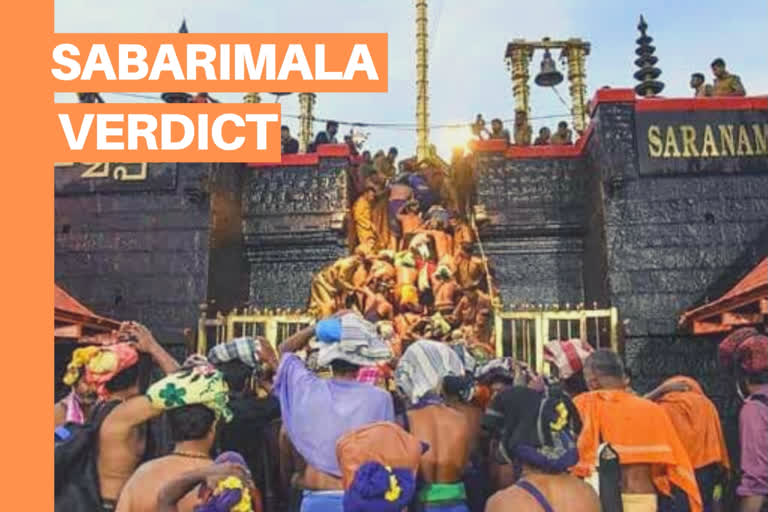New Delhi: In a 3:2 majority verdict, the Supreme Court Thursday referred to a larger 7-judge bench the pleas seeking review of its historic 2018 judgement allowing women and girls of all ages to enter Kerala's Sabarimala temple, set to open on November 17, along with other contentious issues of alleged discrimination against Muslim and Parsi women.
As the majority verdict, penned by Chief Justice Ranjan Gogoi, kept the review pleas pending for a 7-judge bench and did not stay its September 28, 2018 majority judgement, girls and women of all age groups will be entitled to undertake the pilgrimage to the shrine.
The CJI, who wrote on behalf of himself and Justices A M Khanwilkar and Indu Malhotra, said the debate about the constitutional validity of religious practices like bar on entry of women and girls into a place of worship was not limited to the Sabarimala case.
They said such restrictions are there with regard to entry of Muslim women into mosques and 'dargah' and Parsi women, married to non-Parsi men, being barred from the holy fire place of an Agyari.
It was time the apex court evolves a judicial policy to do "substantial and complete justice", the added.
The majority view, delineated by the CJI in its nine-page verdict, was not agreed to by Justices R F Nariman and D Y Chandrachud.
Justice Nariman, writing for himself and Justice Chandrachud, regretted his "inability to agree with" the view of the CJI and said the scope of the review pleas was limited to the entry of menstruating women into the hill-top shrine in Kerala and directed the state government to ensure strict compliance of the 2018 verdict.
The majority judgement also said that a decision by a larger bench "would put at rest recurring issues" with regard to the fundamental right to profess and practice any religion.
Read: BJP says SC order on Rafale 'victory of truth', seeks Rahul's apology
"In the context of the present strength of judges of the Supreme Court, it may not be inappropriate if matters involving seminal issues including the interpretation of the provisions of the Constitution touching upon the right to profess, practise and propagate its own religion, are heard by larger bench of commensurate number of judges," it said.
It set out seven questions of law to be examined by the larger bench. They included -- interplay between freedom of religion under Articles 25 and 26 of the Constitution; need to delineate the expression 'constitutional morality'; the extent to which courts can enquire into particular religious practices; meaning of sections of Hindus under Article 25 and whether 'essential religious practices' of denomination or a section thereof are protected under Article 26.
